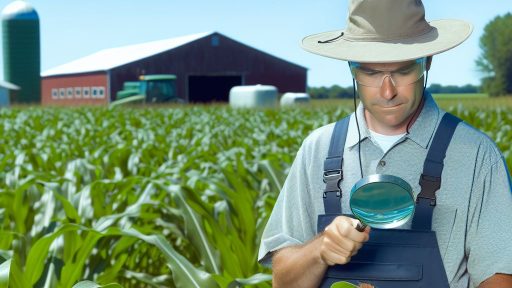Introduction to Farm-To-Table Laws and Their Importance
Farm-to-table laws play a crucial role in modern agriculture.
These regulations promote the direct sale of food from producers to consumers.
Importantly, they encourage local sourcing of ingredients in restaurants and stores.
By supporting local farms, these laws strengthen community ties.
Moreover, they ensure consumers have access to fresh, seasonal produce.
Many states are adopting farm-to-table regulations to boost local economies.
These laws often feature guidelines on food safety and quality standards.
For instance, farm-to-table initiatives can require restaurants to showcase local offerings.
Consequently, consumers become more aware of where their food originates.
This transparency fosters trust among producers, retailers, and consumers.
Impact on Organic Farming Practices
Farm-to-table laws significantly influence organic farming practices.
These regulations often promote sustainable and chemical-free farming methods.
As a result, organic farmers gain new opportunities for market access.
Consumers increasingly seek organic options for health and environmental reasons.
Thus, farms certified as organic can stand out in a competitive marketplace.
Transform Your Agribusiness
Unlock your farm's potential with expert advice tailored to your needs. Get actionable steps that drive real results.
Get StartedFurther, farm-to-table laws may provide financial incentives for organic producers.
For example, states might offer grants or tax breaks for sustainable practices.
Such support helps ensure the viability of organic farming in the long term.
Challenges for Farmers and Producers
However, these laws present challenges for farmers and producers.
Compliance with regulations can be time-consuming and costly.
Some producers may struggle to meet the rigorous standards set by organic certification.
Additionally, smaller farms may lack the resources to market their products effectively.
They often compete with larger agricultural operations with established distribution networks.
Therefore, collaboration among local farmers can enhance their market presence.
By forming cooperatives, they can share resources and reduce costs.
Promoting a Holistic Food System
Ultimately, farm-to-table laws promote a holistic food system.
They nurture relationships among food producers, consumers, and local businesses.
This approach enhances food security and nutrition in local communities.
It also reinforces the importance of mindful consumption.
By prioritizing local and organic sources, communities can thrive together.
As more individuals support farm-to-table initiatives, the movement grows.
In the long run, these laws cultivate a more sustainable food future.
Overview of Organic Farming Practices
Definition of Organic Farming
Organic farming emphasizes the use of natural processes in agriculture.
It avoids synthetic fertilizers and pesticides.
Farmers focus on maintaining soil health and biodiversity.
Key Principles of Organic Farming
Soil management is central to organic practices.
Crop rotation enhances soil fertility and disrupts pest cycles.
Additionally, organic farms often use compost to enrich soil.
Farmers avoid monoculture, promoting a diversity of crops.
Showcase Your Farming Business
Publish your professional farming services profile on our blog for a one-time fee of $200 and reach a dedicated audience of farmers and agribusiness owners.
Publish Your ProfileSustainable Practices in Organic Farming
Sustainable agriculture practices support the environment.
You will find cover crops used to protect soil and prevent erosion.
Integrated pest management minimizes damage using natural predators.
Furthermore, water conservation techniques are highly valued.
Benefits of Organic Farming
Organic farming enhances agricultural biodiversity.
It typically results in healthier soils and ecosystems.
Consumers enjoy fresher produce free from synthetic chemicals.
Moreover, organic farms contribute to local economies.
Challenges in Organic Farming
Organic farming faces various challenges today.
For instance, certification processes can be complex and costly.
Furthermore, organic farmers may experience lower yields initially.
Market access remains a significant barrier for many farmers.
The Relationship Between Farm-To-Table Laws and Local Agriculture
Defining Farm-To-Table Laws
Farm-to-table laws promote direct connections between farmers and consumers.
They encourage restaurants to source ingredients locally.
These regulations aim to support regional agriculture systems.
Impact on Organic Farming Practices
Farm-to-table laws significantly boost organic farming efforts.
Farmers are more motivated to adopt organic practices due to consumer demand.
These laws create a favorable market for organic products.
Supporting Local Economies
These laws enhance local economies by increasing demand for regional produce.
Local farmers benefit financially when consumers prioritize their products.
Consequently, local job opportunities often increase in agriculture-related sectors.
Encouraging Sustainable Farming
Farm-to-table laws align closely with sustainable farming initiatives.
Farmers adopt eco-friendly methods to meet consumer expectations.
For example, many use crop rotation to enhance soil health.
This practice reduces the need for chemical fertilizers.
Challenges Faced by Farmers
While beneficial, these laws also present challenges.
Compliance with regulations can be complex and time-consuming.
Additionally, some small farmers lack the resources to adapt.
Community Engagement and Awareness
Farm-to-table laws foster greater community awareness of local agriculture.
Farmers’ markets and local events support these relationships.
Consumers become more engaged in sustainable practices as a result.
Find Out More: Navigating Chemical Use Compliance On Farms
Impact of Farm-To-Table Laws on Organic Farm Viability
Strengthening Local Economies
Farm-to-table laws strengthen local economies significantly.
They encourage the purchase of locally sourced organic produce.
This support boosts local farmers’ incomes and sustainability.
Furthermore, it fosters community connections and awareness.
Enhancing Consumer Awareness
These laws enhance consumer awareness regarding food sources.
Shoppers gain insights into the benefits of organic farming.
Consequently, they are more likely to support organic products.
Informed consumers tend to prioritize health-focused purchases.
Showcase Your Farming Business
Publish your professional farming services profile on our blog for a one-time fee of $200 and reach a dedicated audience of farmers and agribusiness owners.
Publish Your ProfileCultivating Organic Farming Practices
Farm-to-table initiatives encourage organic farming practices.
They promote sustainable growing methods and crop diversity.
This change positively impacts environmental quality and health.
Additionally, it leads to reduced chemical pesticide use.
Increasing Market Demand
Farm-to-table laws significantly increase market demand for organic goods.
Local restaurants and markets begin prioritizing organic sources.
This trend creates more opportunities for organic farmers.
As a result, farmers expand their operations to meet consumer needs.
Supporting Regulatory Frameworks
These laws also support stronger regulatory frameworks.
They often include guidelines for organic certification processes.
This certification assures consumers of product integrity.
Moreover, it helps farmers adhere to best sustainability practices.
Promoting Collaboration and Networking
Farm-to-table laws promote collaboration among local stakeholders.
Farmers, chefs, and consumers build networks that enhance success.
This collaboration creates a thriving local food culture.
Additionally, shared resources often lead to innovative solutions.
Discover More: Climate Change Policies Affecting Agriculture
Regulatory Requirements for Organic Farmers Under Farm-To-Table Laws
Overview of Farm-To-Table Laws
Farm-to-table laws promote local sourcing of food products.
These laws encourage consumers to buy directly from farmers.
They aim to ensure food safety and quality.
Organic Certification Standards
Organic farmers must adhere to strict certification standards.
These standards dictate how crops are grown and processed.
Additionally, farmers cannot use synthetic pesticides or fertilizers.
Certification requires annual inspections by authorized agencies.
Labeling Requirements
Farm-to-table laws impose specific labeling requirements on organic products.
Farmers must clearly label their goods as organic if they meet standards.
Labels must include information about the farm and production methods.
Traceability and Record Keeping
Farm-to-table regulations require detailed traceability systems.
Organic farmers must maintain records of their farming practices.
This includes documenting inputs, harvests, and sales.
Such transparency enhances consumer trust in organic products.
Local Sourcing Guidelines
Farmers must source ingredients locally when possible.
This requirement supports local economies and reduces carbon footprints.
Farm-to-table laws may provide incentives for compliance.
Compliance Enforcement
Regulatory bodies are responsible for enforcing compliance with these laws.
Non-compliance can lead to fines or loss of organic certification.
Farmers must stay updated on changing regulations to avoid penalties.
Educational Resources
Several organizations provide resources for organic farmers.
These resources include workshops and training sessions.
Farmers can access information about best practices and regulatory updates.
Showcase Your Farming Business
Publish your professional farming services profile on our blog for a one-time fee of $200 and reach a dedicated audience of farmers and agribusiness owners.
Publish Your ProfileStaying informed is crucial for maintaining compliance and successful farming.
You Might Also Like: Technological Innovations In Conservation Programs For Farming
Consumer Demand for Organic Products and Farm-To-Table Initiatives
The Rise of Organic Products
Consumer interest in organic products has surged over the last decade.
Health-conscious individuals prioritize organic options for their purity and nutritional value.
Additionally, consumers are becoming more informed about the benefits of organic farming.
This increasing awareness drives demand for organic farmers to expand their offerings.
Farm-To-Table Initiatives
Farm-to-table initiatives connect consumers directly with local farmers.
These initiatives encourage sustainable practices and support local economies.
Restaurants and stores are embracing this trend to meet consumer preferences.
As a result, many businesses are prioritizing sourcing from organic farms.
Impact on Organic Farming Practices
The demand for organic products directly influences farming methods.
Farmers are adopting organic practices to satisfy consumer preferences.
Transitioning to organic farming often requires commitment and investment.
Nevertheless, many farmers find it rewarding in terms of market opportunities.
Consumer Awareness and Education
Educational campaigns help inform consumers about the benefits of organic products.
These campaigns also promote the importance of supporting local farms.
As awareness increases, consumers often choose organic options over conventional ones.
Consequently, organic farming continues to gain traction in various regions.
Delve into the Subject: Understanding Animal Welfare Laws and Their Impact on Farming

Case Studies of Successful Organic Farms Implementing Farm-To-Table Practices
Sunny Fields Organic Farm
Sunny Fields Organic Farm is a standout example of farm-to-table practices.
This farm prioritizes local produce to enhance community health.
It offers seasonal subscriptions for fresh vegetables and herbs.
Customers appreciate the direct connection with the farm.
This model increases transparency about food sourcing.
Moreover, Sunny Fields collaborates with local restaurants.
This partnership supports the local economy and reduces transportation emissions.
Green Valley Acres
Green Valley Acres focuses on sustainable livestock management.
They raise grass-fed beef and pasture-raised chickens.
The farm sells products directly at farmer’s markets and through local grocers.
Consistently, their practices improve animal welfare and product quality.
Additionally, they host workshops to educate the community about sustainable practices.
Harvest Moon Farms
Harvest Moon Farms exemplifies innovative farm-to-table solutions.
They leverage hydroponic systems to maximize space and resources.
Customers can purchase their produce via an online platform.
This accessibility enhances consumer awareness about food sources.
Furthermore, Harvest Moon partners with local chefs for special events.
This collaboration promotes seasonal menus focusing on local ingredients.
Willow Grove Farm
Willow Grove Farm emphasizes organic fruit production.
They grow a variety of fruits, including heirloom apples and berries.
The farm operates a “pick-your-own” fruit experience.
Showcase Your Farming Business
Publish your professional farming services profile on our blog for a one-time fee of $200 and reach a dedicated audience of farmers and agribusiness owners.
Publish Your ProfileThis approach fosters community engagement and connection to agriculture.
Additionally, they supply fresh fruit to local schools and shelters.
Such initiatives highlight their commitment to social responsibility.
Challenges Faced by Organic Farmers Due to Farm-To-Table Regulations
Understanding Farm-To-Table Regulations
Farm-to-table regulations promote local food sourcing and sustainability.
They require farmers to follow specific guidelines to sell direct to consumers.
Organic farmers must navigate these rules efficiently to thrive.
Compliance Costs
Organic farmers often face high compliance costs due to regulations.
They need to invest in certifications to meet organic standards.
These costs can strain small farms with limited budgets.
In addition, farmers incur costs for record-keeping and inspections.
Market Access Limitations
Farm-to-table regulations can limit market access for organic farmers.
Some regulations favor larger farms with better resources.
Small organic farmers may struggle to compete in the marketplace.
Additionally, they might find it challenging to connect with local restaurants.
Consumer Awareness and Education
Many consumers lack understanding of organic farming benefits.
Farm-to-table laws may not adequately inform them of organic options.
This can hinder organic farmers from gaining customer trust.
Education campaigns can help bridge this gap effectively.
Seasonality and Supply Chain Issues
Organic farmers must contend with the seasonality of crops.
Farm-to-table initiatives often highlight fresh, in-season produce.
This can complicate year-round supply for organic products.
Farmers may need to supplement with non-organic items off-season.
Quality Control Challenges
Maintaining quality is essential for organic products.
Farm-to-table regulations demand high standards for food safety.
Organic farmers must ensure their practices comply with these standards.
Failing to meet quality expectations can harm their reputation.
Future Trends in Organic Farming Aligned with Farm-To-Table Movements
Increased Demand for Local Produce
Consumers increasingly prefer locally sourced organic products.
This trend reflects a growing awareness of food origins.
Consumers appreciate the freshness that local produce provides.
Farm-to-table initiatives encourage farmers to adapt quickly.
As a result, farmers are diversifying their crops.
Technological Innovations in Organic Practices
Farmers are adopting new technologies to enhance organic farming.
For instance, precision agriculture helps optimize resource use.
Additionally, drone technology can monitor crop health efficiently.
Farmers can track soil conditions using advanced sensors.
These tools ultimately improve yields without harmful chemicals.
Shift Toward Regenerative Agriculture
Regenerative practices are gaining momentum in organic farming.
This approach focuses on restoring soil health and ecosystems.
Farmers employ cover crops to improve soil structure.
Similarly, rotational grazing benefits livestock and land alike.
Showcase Your Farming Business
Publish your professional farming services profile on our blog for a one-time fee of $200 and reach a dedicated audience of farmers and agribusiness owners.
Publish Your ProfileMoreover, this method enhances biodiversity on farms.
Collaboration Between Farmers and Chefs
Stronger partnerships between farmers and chefs are emerging.
Chefs are increasingly interested in seasonal, local ingredients.
This collaboration leads to unique culinary experiences.
Moreover, it allows direct feedback from chefs to farmers.
Such feedback helps farmers tailor their products to market needs.
Emphasis on Sustainable Practices
Sustainability is becoming a cornerstone in organic farming.
Farmers are committing to practices that minimize waste.
Additionally, they focus on reducing carbon footprints.
Practices like composting and water conservation are vital.
Such dedication can attract eco-conscious consumers.




